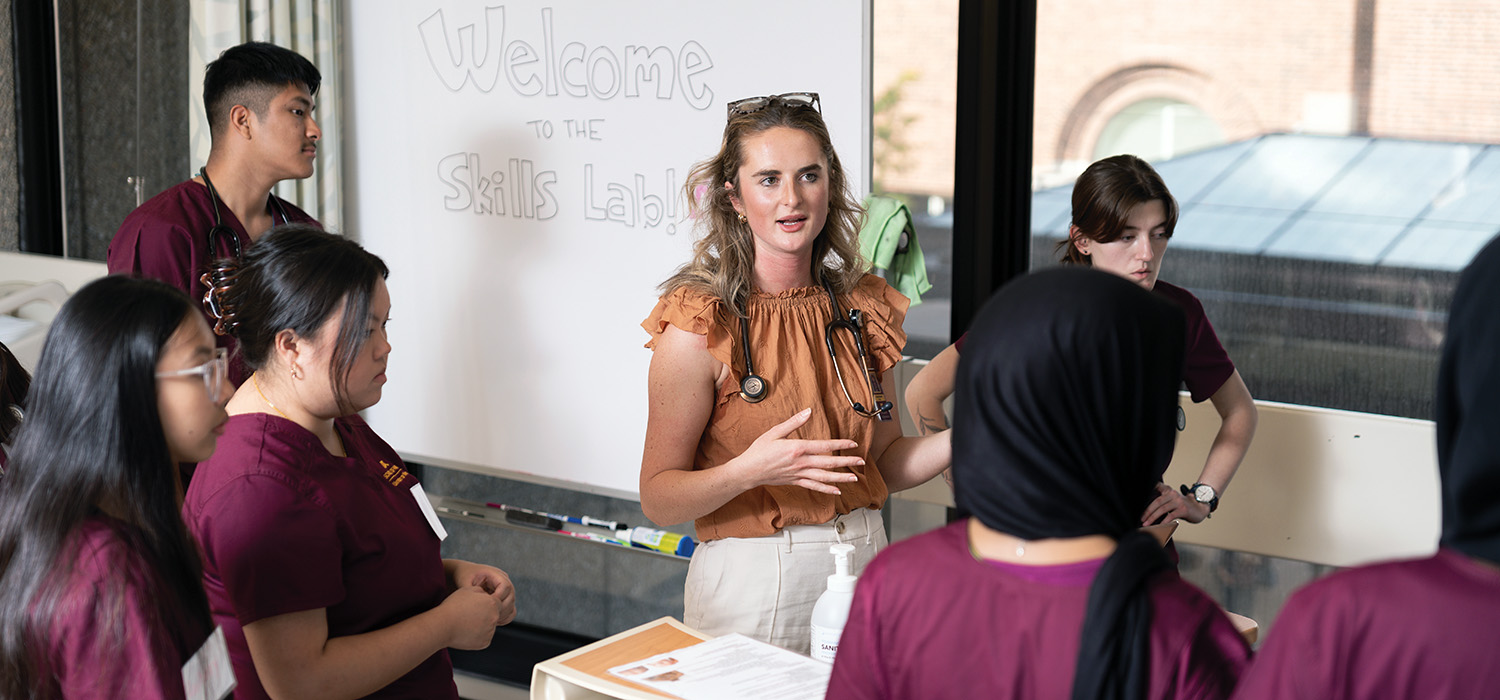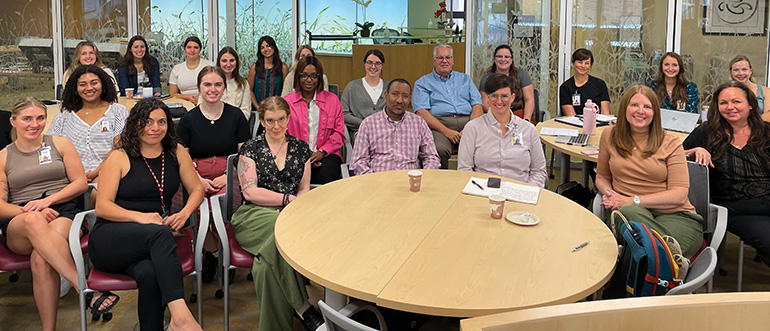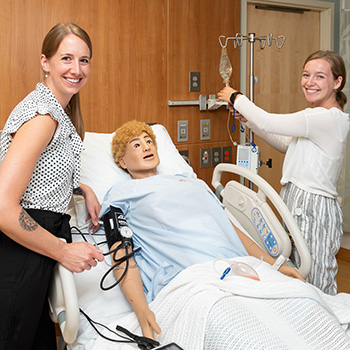DNP students help shape tomorrow’s nurses
Teaching assistants provide mentorship and insight while developing nurse educator skills and earning tuition remission
November 11, 2024
Brett Stursa

Elena Bueltel leads a skills lab class as a teaching assistant. Bueltel is also a Doctor of Nursing Practice student, studying to become a family nurse practitioner.
As sophomore Bachelor of Science in Nursing students gather in the skills lab early in the semester, their steady attention is on taking vitals.
At the head of the class, Elena Bueltel, BSN, RN, is leading students through new skills, including how to use a blood pressure cuff, that will eventually become second nature.
Bueltel is serving her fourth semester as a teaching assistant, where she’s been both a clinical instructor and a teaching assistant in the skills lab. She’s also a Doctor of Nursing Practice (DNP) student in the family nurse practitioner specialty.
While nationally nursing schools struggle with a dearth of clinical instructors, the University of Minnesota School of Nursing utilizes current DNP students — who often are also practicing nurses — as teaching assistants for pre-licensure students. The TAs provide pre-licensure students with mentorship and share real-life experience, while giving TAs opportunities to hone their teaching skills and earn tuition remission.
“We want our pre-licensure learners to be in the hands of contemporary nurses that are engaged in practice at the same time that they’re building their expertise in advanced practice,” says Susan Gross Forneris, PhD, RN, CNE, CHSE-A, FAAN, Katherine R. & C. Walton Lillehei Chair in Nursing Leadership, associate dean for Academic Programs. “We envision our teaching assistants as part of our teaching team because they’re taking our learners from the classroom and helping them use their classroom knowledge and content in a real-life environment. The students need a contemporary role model who’s experienced in the clinical practice to provide that mentoring and coaching at the bedside.”
The school utilizes around 70 TAs each semester in three areas — in the skills lab coaching students through simulations, in classroom settings supporting faculty and in clinical settings supporting students in their clinical rotations.
“In the fall, we envelop them as part of the team. We give them a grounding of our curriculum, their role, our teaching philosophy and educator skill building in their role,” says Gross Forneris.
Inspired by their own teaching assistants
For Bueltel, who juggles being a TA and a DNP student with also being an oncology nurse at the University of Minnesota Medical Center, becoming a TA was something she aspired to after she experienced their impact firsthand. “I went to undergrad here at the University of Minnesota, and I remember having the most respect and loved learning from nurse practitioner students. In our clinical rotations, I felt so comfortable with them. It was that relationship and support that interested me,” she says.
DNP student Abbi Schultz, BEN, RN, PHN, was also inspired to become a TA because of her own experiences as a pre-licensure student at the school. “I am now happy to provide guidance to nursing students and inspire them to be the best nurse they can be. I love to encourage my students to allow all of their own personality and previous experience to flow into their care of patients,” says Schultz.

The perspective of practice
The TAs are guided by lead faculty who stay connected week by week so they can link the coursework to clinicals and suggest areas of focus during post-clinical debriefing. “There’s a lot of support for the TAs in terms of staying in touch with our learners and staying in tune with what’s going on in the curriculum,” says Gross Forneris.
The TAs can see their encouragement and mentoring help pre-licensure students gain confidence. “They can ask us about our clinical experience and about stories we have with patients and then by the end of year, some of the students get teary when they think about how far they’ve come and the confidence they have and skills they are now able to perform. It’s very special to be able to support growth in the role for them,” says Hayley Morkeberg, BSN, RN, who is a family nurse practitioner student and serves as a lead TA in the skills lab.
Those connections remain even after the semester is over. TAs often stay in touch with students, providing career advice, letters of recommendation and information about internship opportunities.
“We bring a perspective of practice into the role. A lot of the students are trying to determine what type of nursing they want to pursue. We all have such a variety of nursing practice backgrounds and we are able to bond with the students in a way that helps them better understand their options,” says Hannah Reece, BSN, RN, who is a women’s health nurse practitioner student.
Reece embraced the responsibility that comes with being a TA and is now serving as a lead TA with Morkeberg in the skills lab.
“As lead TA, I’ve been impressed with our engagement in the decision tree. The professors seek feedback to make their courses better. As TAs, it’s fun to be the eyes on the ground, in it with the BSN students, and able to advocate for them,” says Reece.
Cultivating nurse educators

The TA positions come with a percentage of tuition remission reflective of workload, as well as hourly pay and health insurance. Reece has had as much as 90% of her tuition covered, depending on the semester. “It’s allowed me to earn a DNP degree without going into debt. And I’m becoming a better nurse educator along the way. It’s not just a win-win, it’s like a hundred wins,” says Reece.
Gross Forneris says developing teaching skills in doctoral students is by design.
“They’re going on to further their education to take a more in depth and focused role in nursing practice, and also to teach. I think too often we don’t take into account the value of that clinical teaching at the bedside,” says Gross Forneris.
It’s also opened some DNP students’ eyes to the possibility of being a nurse educator.
“In undergraduate, I didn’t see myself as a nurse educator. Now after these experiences, it’s definitely opened my eyes. You really see the impact of a good educator and how it helps these students grow,” says Bueltel.
Helping students grow and gain confidence translates to a smoother transition into the profession and prepares new graduates for success when they enter the work force.
“Being part of the investment into the future generation of nurses is appealing, to be able to make a difference in those future nurses and to translate the knowledge I’ve gained from my practice to those nurses. It’s impactful and rewarding to make those relationships with nursing students,” says Bueltel.


